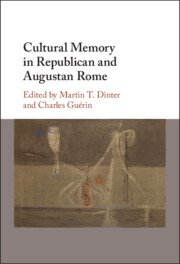Book contents
- Cultural Memory in Republican and Augustan Rome
- Cultural Memory in Republican and Augustan Rome
- Copyright page
- Contents
- Figures
- Contributors
- Acknowledgements
- Chapter 1 Introduction: What is Cultural Memory?
- Part I Writing Cultural Memory
- Chapter 2 War and Cultural Memory at the Beginnings of Latin Literature
- Chapter 3 Creating Roman Memories of Plautus
- Chapter 4 Comedy and Its Pasts
- Chapter 5 Semper Manebit: Poetry and Cultural Memory Theory in Cicero’s De Legibus
- Chapter 6 Varro and the Re-foundation of Roman Cultural Memory Through Genealogy and Humanitas
- Chapter 7 Cultural Memory, from Monument to Poem: The Case of the Temple of Apollo Palatinus in the Augustan Poets
- Chapter 8 Monumenta and the Fallibility of Memory in the Odes
- Chapter 9 Constructing Cultural Memory in Ovid’s Fasti: The Case of Servius Tullius and Fortuna
- Part II Politicising Cultural Memory
- Part III Building Cultural Memory
- Part IV Locating Cultural Memory
- Bibliography
- Index Locorum
- Index
Chapter 5 - Semper Manebit: Poetry and Cultural Memory Theory in Cicero’s De Legibus
from Part I - Writing Cultural Memory
Published online by Cambridge University Press: 27 April 2023
- Cultural Memory in Republican and Augustan Rome
- Cultural Memory in Republican and Augustan Rome
- Copyright page
- Contents
- Figures
- Contributors
- Acknowledgements
- Chapter 1 Introduction: What is Cultural Memory?
- Part I Writing Cultural Memory
- Chapter 2 War and Cultural Memory at the Beginnings of Latin Literature
- Chapter 3 Creating Roman Memories of Plautus
- Chapter 4 Comedy and Its Pasts
- Chapter 5 Semper Manebit: Poetry and Cultural Memory Theory in Cicero’s De Legibus
- Chapter 6 Varro and the Re-foundation of Roman Cultural Memory Through Genealogy and Humanitas
- Chapter 7 Cultural Memory, from Monument to Poem: The Case of the Temple of Apollo Palatinus in the Augustan Poets
- Chapter 8 Monumenta and the Fallibility of Memory in the Odes
- Chapter 9 Constructing Cultural Memory in Ovid’s Fasti: The Case of Servius Tullius and Fortuna
- Part II Politicising Cultural Memory
- Part III Building Cultural Memory
- Part IV Locating Cultural Memory
- Bibliography
- Index Locorum
- Index
Summary
Unlike Cicero the orator, philosopher, and celebrated opponent of tyrants, Cicero the poet died a relatively speedy death and left an uncontested legacy. Cicero’s poetic activity earned little mention after his death, and, except for a more holistic assessment from Plutarch, was typically discussed only to be mocked or wished away.1 Regardless of its literary value, I suggest that Cicero understood his poetry as a means to influence and codify memory, and that discussions of his poetry led him to intuit concepts relevant to modern memory studies. To demonstrate this, I turn to Cicero’s De Legibus, a fragmentary dialogue from the late 50s BCE.2 Although the work’s central concerns are legal and political philosophy, it opens with a discussion of a scene from Cicero’s Marius, alongside consideration of Cicero’s potential to write history. Because of this, scholarly treatments that eschew philosophical and legal approaches often examine questions of genre and historical writing.3
- Type
- Chapter
- Information
- Cultural Memory in Republican and Augustan Rome , pp. 80 - 96Publisher: Cambridge University PressPrint publication year: 2023



